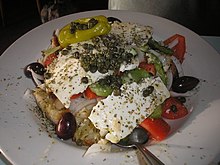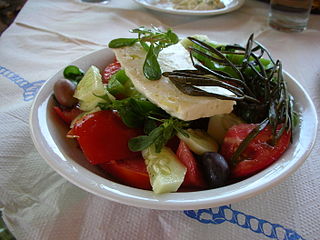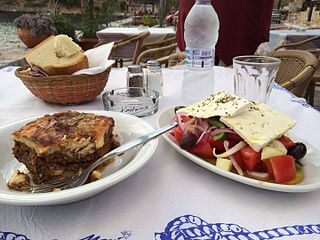food.wikisort.org - Dish
Greek salad or horiatiki salad (Greek: χωριάτικη σαλάτα[lower-alpha 1] or θερινή σαλάτα[lower-alpha 2]) is a popular salad in Greek cuisine generally made with pieces of tomatoes, cucumbers, onion, feta cheese (usually served as a slice on top of the other ingredients), and olives (typically Kalamata olives) and dressed with salt, Greek oregano, and olive oil. Common additions include green bell pepper slices or caper berries (especially on the Dodecanese islands). Greek salad is often imagined as a farmer's breakfast or lunch, as its ingredients resemble those that a Greek farmer might have on hand.[1]
 Horiatiki salad with Feta cheese as served on Hydra Island, where cucumber is peeled. In other regions, cucumbers are left unpeeled. | |
| Place of origin | Greece |
|---|---|
| Main ingredients | Tomatoes, cucumbers, onions, feta cheese, olives (usually Kalamata olives), salt, oregano, olive oil |
Outside Greece

Outside Greece, "Greek salad" may be a lettuce salad with Greek-inspired ingredients, even though the original dish is distinguished by the absence of lettuce. Meanwhile, the variant without lettuce may be called horiatiki, 'peasant salad', or 'village salad'.
However in most European countries, including the UK, the dish broadly resembles the original, albeit often with non-Greek substitutions such as another cheese since feta cheese enjoys protected designation of origin status.
In an American-style Greek salad, lettuce, tomatoes, feta (often served in multiple cube-shaped cuttings mixed with the vegetables), and olives are the most standard elements, but cucumbers, peperoncini (pickled hot peppers), bell peppers, onions, radishes, dolmades, and anchovies/sardines are common. Regional variants may include unusual components, e.g. in Detroit, beets, and in the Tampa Bay Area, potato salad. Dressings containing various herbs and seasonings are frequently used in the U.S. These styles of Greek salad are rarely encountered in Greece.
Various other salads have also been called "Greek" in the English language in the last century, including some with no apparent connection to Greek cuisine. A 1925 Australian newspaper described a Greek salad of boiled squash dressed with sour milk;[2] a 1934 American newspaper described a mayonnaise-dressed lettuce salad with shredded cabbage and carrots.[3]
Other salads in Greece and Cyprus
This section needs additional citations for verification. (December 2016) |

There are many other salads in Greek cuisine. These include:
- marouli (μαρούλι; a salad with lettuce, onion and dill)
- lahanosalata (λαχανοσαλάτα; a shredded fresh cabbage salad dressed with olive oil, lemon juice, and garlic)
- pantzarosalata (παντζαροσαλάτα; boiled and sliced beetroots, sometimes with beet greens as well, dressed with olive oil and red wine vinegar)
- salata roka (σαλάτα ρόκα; rocket (arugula) dressed with olive oil and red wine vinegar or lemon juice, possibly including anchovies)
- patatosalata (πατατοσαλάτα; a potato salad with olive oil, finely sliced onions, lemon juice or vinegar)
- revithosalata (ρεβιθοσαλάτα; a chickpea salad)
- maintanouri (μαϊντανούρι; a parsley salad usually used as a condiment)
- Cypriot salad,[4] native to the island of Cyprus, consists of finely chopped tomatoes, capers, cucumbers, onions, flat-leaf parsley, feta cheese, dressed with olive oil and lemon or red wine vinegar, and closely resembles the "Greek salad" of Greece.
Some spreads and dips found in the meze of Greek cuisine are also called "salads" in Greek, such as melitzanosalata, taramasalata and tzatziki.
Gallery
- Horiatiki salad as served in the Dodecanese islands
- Greek salad in Thessaloniki
- Horiatiki salad served with moussaka in Laconia, Peloponnesus
- Greek salad as served in other countries. The main differences are the serving of the feta cheese in multiple cube-shaped cuttings instead of a single rectangular-piece and the more liberal supply of onion.
- Greek-inspired salad as served in Copenhagen, Denmark
See also
- Shopska salad, a similar salad from Bulgaria
- Çoban salatası, a similar salad from Turkey
- Serbian salad, a similar salad from Serbia
- Israeli salad, a similar salad from Israel
- Arab salad, a similar salad from the Arab world
- King's Hand, a novelty dish including Greek salad
References
- horiatiki salata, pronounced [xorˈʝatici saˈlata], lit. 'village salad' or 'rustic salad'
- therini salata, pronounced [θeriˈni saˈlata], lit. 'summer salad'
- Zhang, Jenny. "A Modern Tradition: Greek Salad". Organically Blissful. Retrieved 15 December 2016.
- "The Age – Google News Archive Search". google.com. January 13, 1925. p. 7.
- The Daily Times (Rochester and Beaver, Pennsylvania), March 13, 1934
- "Cypriot Salad".
На других языках
- [en] Greek salad
[ru] Греческий салат
Гре́ческий сала́т (салат хориа́тики, греч. χωριάτικη σαλάτα — деревенский салат) — греческий салат из помидоров, сладкого перца, огурцов, феты, шалота и маслин, заправленный оливковым маслом с солью, чёрным перцем, душицей. Ключевым ингредиентом салата является фета — традиционный греческий сыр из овечьего или козьего молока. В салат иногда добавляют — каперсы или анчоусы.Другой контент может иметь иную лицензию. Перед использованием материалов сайта WikiSort.org внимательно изучите правила лицензирования конкретных элементов наполнения сайта.
WikiSort.org - проект по пересортировке и дополнению контента Википедии




